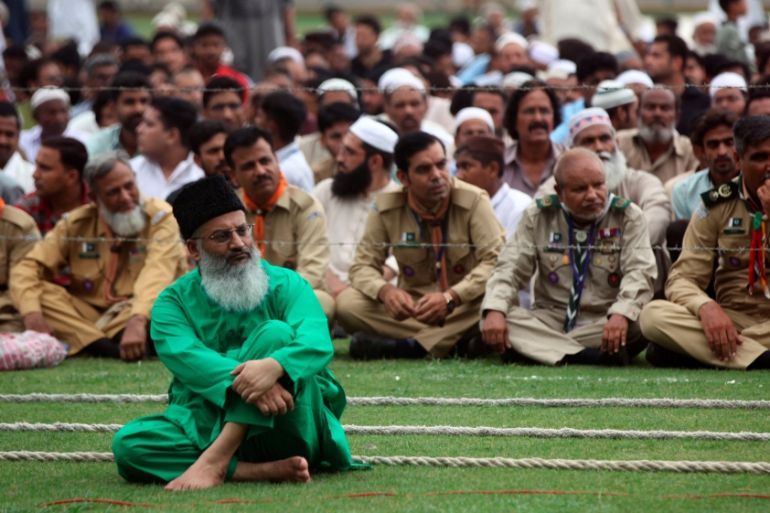Thousands attend funeral for Pakistan’s legendary Edhi
Tens of thousands attended the state funeral for Pakistan’s legendary philanthropist Abdul Sattar Edhi in Karachi.

Prominent Pakistani philanthropist and humanitarian Abdul Sattar Edhi was laid to rest on the outskirts of Karachi on Saturday at a state funeral attended by thousands of people.
Edhi, 88, died late on Friday at a medical centre after a long battle with kidney disease. His death triggered a massive outpouring of grief across the nation of 190 million for a man who trancended social, ethnic and religious divisions.
Keep reading
list of 4 items‘We share with rats’: Neglect, empty promises for S African hostel-dwellers
Thirty years waiting for a house: South Africa’s ‘backyard’ dwellers
Photos: Malnutrition threatens future Afghan generations
Tens of thousands attended Saturday’s ceremony, the first state funeral since the 1980s, at Karachi’s National Stadium.
At one moment, crowds broke through the military lines to help carry Edhi’s coffin, which was draped with Pakistan’s green and white flag and covered with rose petals.
Pakistan’s top civilian and army leadership offered funeral prayers at the stadium, as the country mourned the loss of a man commonly known as the “Angel of Mercy” for his internationally acclaimed social work.
![Soldiers carry the coffin of Abdul Sattar Edhi at Karachi's National Stadium [Ali Manzoor / Al Jazeera]](/wp-content/uploads/2016/07/baa343091c2f47f1a974adc64c27c179_18.jpeg)
Pakistan army chief Raheel Sharif and prominent politicians attended final prayers at the stadium in the first state funeral since the death of military dictator General Zia ul-Haq in 1988.
But other Pakistanis lamented the way the government had conducted Edhi’s funeral.
“Saddest of all is the barrier between Edhi and ordinary people. The state continues to fail to understand Edhi and what his work was about,” said one Twitter user identified as Basma.
For more than 60 years the Edhi Foundation, a charity he created with his wife, Bilquise, has run clinics and orphanages across Pakistan and managed a fleet of ambulances that provided much-needed assistance to poor communities failed by an inadequate public health and welfare system.
“He was one of the chosen ones. People like him come once in many centuries, and he was a special chosen one,” one woman, who asked to remain anonymous, told Al Jazeera at the funeral.
Pakistan: More to offer than bombs and beards
Prime Minister Nawaz Sharif said Pakistan had lost “a great servant of humanity”, and announced Saturday as a national day of mourning.
Many others took to social media to grieve over the loss of a man they called a “living saint” and “Pakistan’s Mother Teresa”.
“Edhi worked for the downtrodden all his life. Attending his funeral is the least we could do to pay our tributes,” shopkeeper Siraj Ahmed, 34, told Reuters news agency outside the stadium where the army fired a 19-gun salute to mark Edhi’s death.
The foreign minister of India, Pakistan’s historic foe, said Edhi “was a noble soul who dedicated his life in service of mankind”, while Pakistani teenage Nobel laureate Malala Yousafzai told the BBC she had nominated him for the same peace prize.
A hero to the poor
Born in the western state of Gujarat in British India, Edhi and his Muslim family moved to Pakistan in 1947 during the violent partition of the subcontinent.
He built up his charity solely through donations, focusing on addicts, battered women, orphans and the disabled.
Despite the vast sums of money that passed through his charitable foundation, Edhi lived modestly with his family in a two-room apartment adjacent to the headquarters of his foundation.
Renowned for an ascetic lifestyle and recognised by his long white beard and traditional black cap, Edhi was a hero to the poor but infuriated some religious leaders with his refusal to give preferential treatment to Muslims above minorities.
He also berated hardline groups for attacking civilians, criticised the government for incompetence and corruption, and denounced tax-dodging by the rich.
Despite constant threats, the Edhi Foundation became Pakistan’s most relied upon social safety net, handling many of the responsibilities that the Pakistani government could not.
The Edhi foundation was at the forefront of the response last year when a devastating heatwave struck Karachi, a city of more than 20 million people.
Edhi was laid to rest in the clothes he died in, and buried in a grave he himself dug several years earlier at the Edhi village near Karachi.
|
|